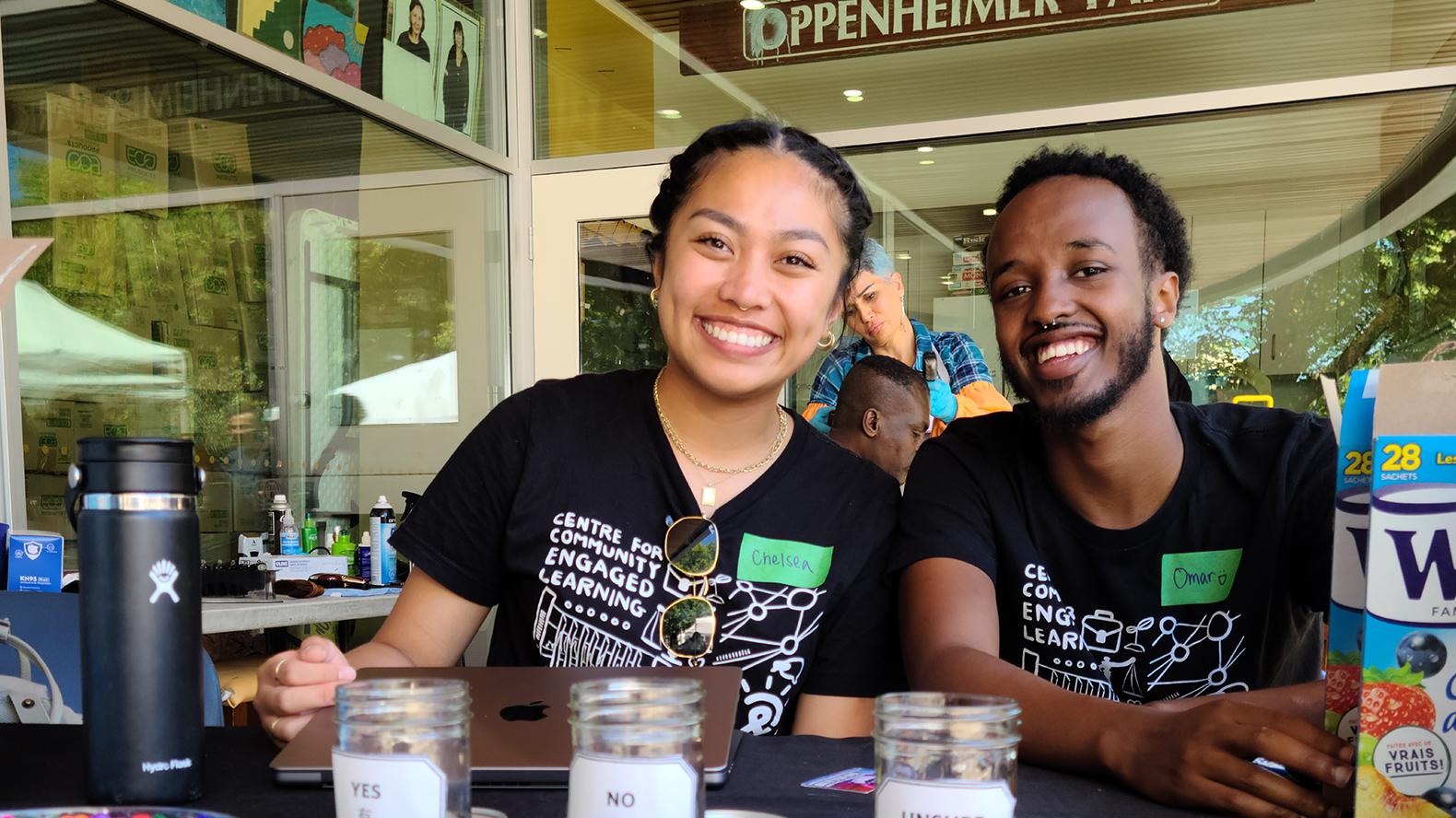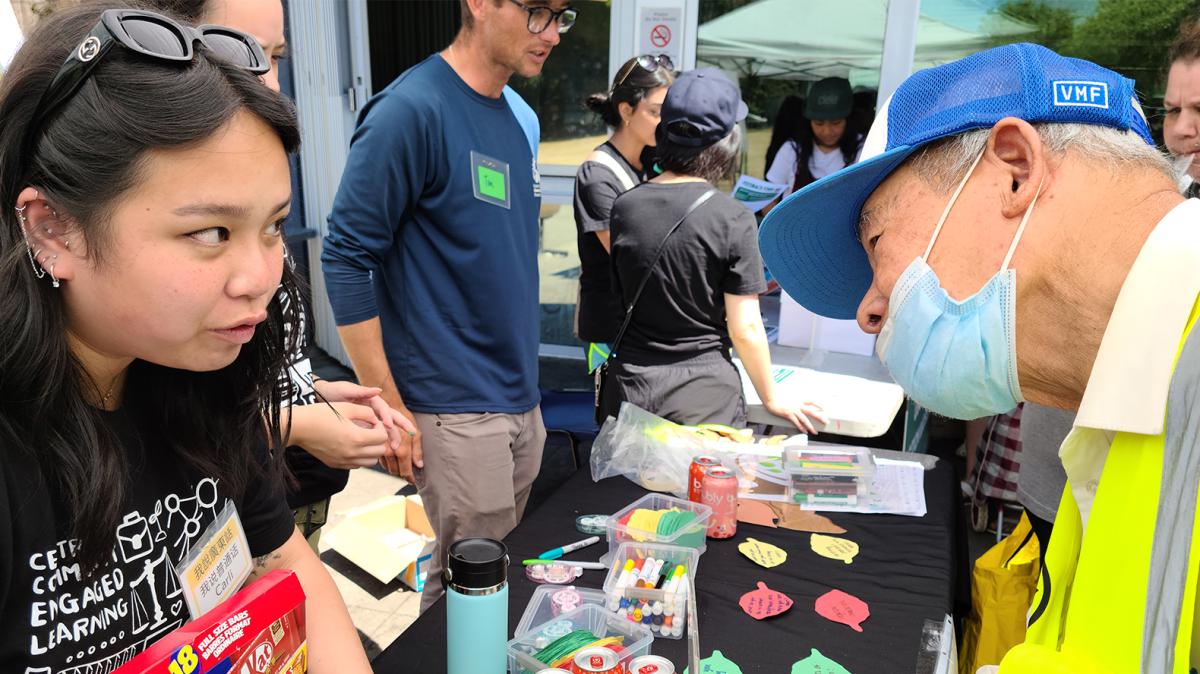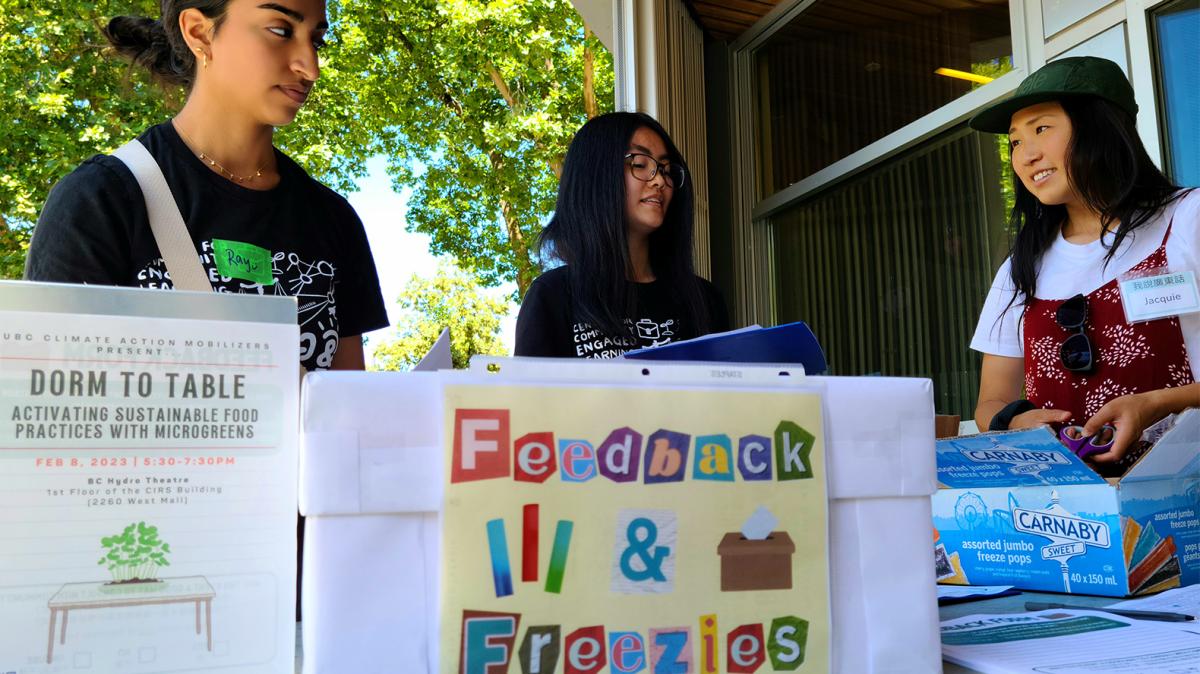
Climate Equity Action and Resilience (CLEAR) was created by the UBC Sustainability Hub and the UBC Learning Exchange, working with four DTES community organizations.
Photo credit: Geoff D'Auria, UBC Learning Exchange.
By Linda Nowlan and Tim Linsell
A summer’s day in the Downtown Eastside’s (DTES) Oppenheimer Park. Scorched grass, beating sun, and temperatures set only to climb are the order of the day in this summer of record-shattering extreme heat. Close to 250 people gather under the larger trees looking for shade as they wait to pick from the donated clothing and footwear laid out in the park building. Whether residents need a pair of size 13 work boots, a child’s jacket, a high-visibility safety vest, or a summer dress, the volunteers at Working Gear have a wide selection from which to draw.

As people leave, they stop under shaded awnings to get a freezie and chat with Climate Action Mobilizers (CAM), a group of UBC students who designed the event. Setting up several booths, they talk to attendees of the clothing pop-up in multiple languages, focusing on how residents experience climate change in their daily lives, and offering insights that can greatly assist the work of the CLEAR (Climate Equity Action and Resilience) initiative.
CLEAR was created by the UBC Sustainability Hub and the UBC Learning Exchange, working with four DTES community organizations EMBERS Eastside Works [emberscanada.org], Working Gear [workinggear.ca], Union Gospel Mission [ugm.ca], and Recycling Alternative [recyclingalternative.com]. The project will help the university to understand how to share its research while building the capacity of disproportionally impacted residents to advocate for climate justice-oriented policy reform and action. The goal is to amplify under-represented voices to improve climate policies and outcomes.

Meeting people where they stand and hearing from the community in innovative settings is one way that the project works towards this goal. Working Gear organizes many clothing exchange pop-ups over the course of the year at several community centers and gathering places, which have proven to be extremely popular. A special attraction is the free haircuts delivered by Atti.
Community Feedback
The CAM climate conversations marked a new addition to past pop-ups, and the CAM team recently finalized a summary of what they heard across four stations throughout the day. At one of the tables at Oppenheimer Park, people rated different pieces of equipment designed for DIY cooling such as spray bottles, water bottles, indoor thermometers, and freezer gel packs. Participants ranked each item, discussing their personal preferences and suggesting how they could be improved.
At another table, the "Heat Re-Leaf Tree" provided a space for the community to share their coping strategies for extreme heat. Some shared traditional methods of staying cool, like finding water, using fans, or staying in the shade, while others suggested community-based solutions like organizing neighborhood cooling centers and routine check-ins with friends and neighbours.
The "Drop the Bead" station probed the community's awareness of climate change. Asked “Are people in your community talking about climate change” attendees dropped beads into jars marked "Yes, No, and Unsure". Over the course of the day, it became increasingly evident that residents were increasingly talking about climate change and its impacts.
Finally, "Freezies & Feedback," gave people a platform to share their thoughts on support during extreme heat events. Feedback ranged from practical suggestions about increasing access to cooling centers to broader ideas about affordable housing and green infrastructure.
The Center for Community Engaged Learning created the CAM program with a grant from the Climate Emergency Fund. Embracing the philosophy that the program was “for students and by students”, the group of 10 mobilizers were fully responsible for all of the climate conversations that took place on the day.

Climate Crisis in Vancouver
UN Secretary General Antonio Guterres recently called this phase of climate change “global boiling.” In the US, extreme heat is the number-one weather-related cause of death, killing more people most years than hurricanes, floods and tornadoes combined. As the climate crisis continues to deepen cities such as Vancouver must look at how they can meaningfully engage and work with those most impacted.
The devastating 2021 heat dome brought the impacts of climate change close to home for Vancouver residents. The 600+ deaths it caused were a hard blow to the city. In rainy grey Vancouver, extreme heat is not thought of as a killer. But now that’s starting to change.
The need for more climate conversations has never been stronger. More pop-ups and engagement events are being planned for the fall, so the dialogue around our response to climate change can continue.